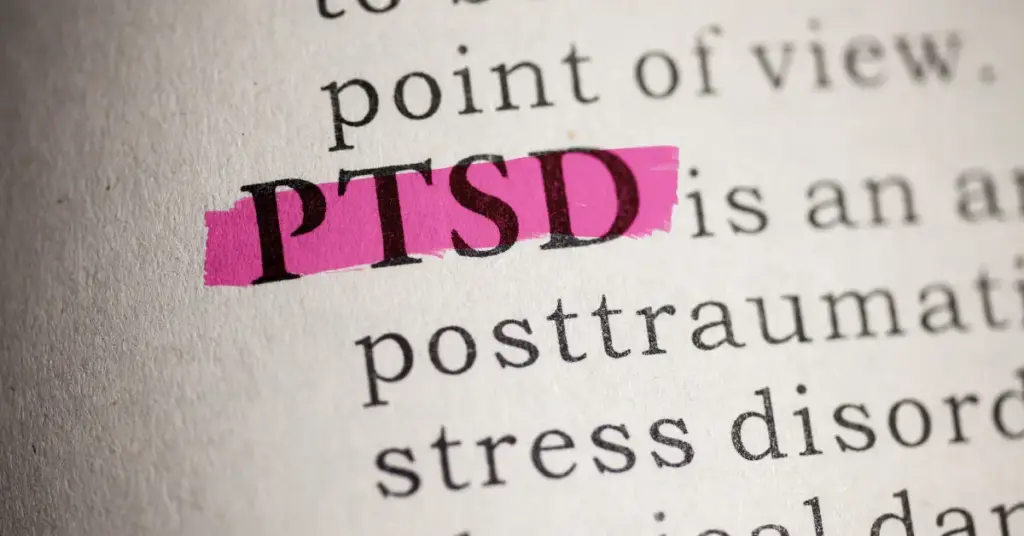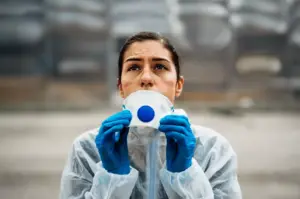
Post-traumatic stress disorder (PTSD) is a serious mental health condition triggered by exposure to a traumatic event. This article delves into the critical aspects of PTSD, including its symptoms, causes, and available treatments. Whether you’re seeking information for yourself or aiming to support someone affected, understanding PTSD is essential for effective management and recovery. Read on to explore comprehensive treatment strategies and supportive measures that can make a significant difference in the lives of those impacted.
What Is PTSD?
Post-Traumatic Stress Disorder (PTSD) is a mental health condition triggered by experiencing or witnessing a terrifying event ¹. Individuals with PTSD may suffer from intense, disturbing thoughts and feelings related to their traumatic experiences. This can manifest as heightened anxiety, pervasive sadness, or numbness, with symptoms including flashbacks, nightmares, and uncontrollable thoughts about the event.
Unlike other stress-related disorders, such as Acute Stress Disorder (ASD) ² or adjustment disorders, which typically resolve naturally over time, PTSD can persist for months or even years, significantly impairing an individual’s ability to function.
ASD, for instance, usually occurs immediately after the trauma and resolves within a month ² ; if symptoms persist, the diagnosis might evolve into PTSD. Adjustment disorders, marked by emotional or behavioral responses to stressful life changes, are generally less severe than PTSD, showcasing the unique intensity and persistence of PTSD symptoms.
The Chronic and Complex Levels of PTSD
Complex Post-Traumatic Stress Disorder (C-PTSD) is a condition that results from prolonged exposure to traumatic events, often over months or years, rather than a single traumatic incident. This can include ongoing abuse, long-term domestic violence, or being a prisoner of war. Individuals with C-PTSD may experience severe emotional dysregulation, distrust of others, feelings of emptiness or hopelessness, and persistent feelings of threat or despair. The symptoms extend beyond those typically associated with PTSD, often including difficulties with relationships, self-perception, and emotional control.
Chronic PTSD refers to Post-Traumatic Stress Disorder symptoms that persist for more than three months after the traumatic event. This form of PTSD indicates that the symptoms are long-standing and have not resolved over time, making it difficult for individuals to recover without intervention. Chronic PTSD sufferers continue to experience the standard symptoms of PTSD, such as flashbacks, avoidance behaviors, and increased arousal, but these symptoms are enduring and resist resolution.
Complex trauma describes exposure to multiple traumatic events that are generally invasive and interpersonal in nature. This type of trauma often occurs at developmentally vulnerable times in an individual’s life, particularly in childhood, and can disrupt many aspects of psychological development and well-being. Complex trauma often involves direct harm, neglect, or betrayal by caregivers or other entrusted individuals, leading to profound and wide-ranging effects on emotional, cognitive, and social development.are enduring and resist resolution.
Complex PTSD vs PTSD
While PTSD typically results from a single traumatic event and includes symptoms like re-experiencing, avoidance, and hyperarousal, Complex PTSD stems from chronic or repeated trauma where the individual has little or no chance of escape, such as long-term abuse. C-PTSD includes all the symptoms of PTSD along with additional symptoms such as difficulty in controlling emotions, feeling very hostile or distrustful towards the world, feeling constantly threatened, and having a distorted self-perception or feeling detached from oneself.
Complex Trauma vs PTSD
Complex trauma involves exposure to multiple traumatic events, often of an interpersonal nature and typically prolonged or repeated. The concept is broader than PTSD, which can develop from a single event. Complex trauma often results in more pervasive impacts on the individual’s mental health, affecting emotional regulation, self-concept, and relationship building. It can lead to severe personality changes and disturbances, which are not necessarily encompassed by the standard diagnostic criteria of PTSD.
Chronic PTSD vs PTSD
The key difference between Chronic PTSD and PTSD is the duration of symptoms. Chronic PTSD refers to cases where the symptoms persist for a prolonged period, typically more than three months, and sometimes lasting for years after the trauma. This persistence can complicate recovery, often requiring more intensive and prolonged treatment approaches compared to PTSD that resolves within a shorter time frame.
Each of these forms of trauma-related psychological conditions requires nuanced understanding and specialized treatment approaches to effectively support recovery and healing.
The prevalence of PTSD and the chronic, complex exposure to trauma underscores its impact. According to the World Health Organization (WHO) 3.9% of the world’s population suffered from PTSD at one point in their life, with women being nearly twice as likely as men to develop this condition ³. In the United States, the Centers for Disease Control and Prevention (CDC) reports that approximately 8 million adults have PTSD during a given year, highlighting the critical need for effective treatment and support systems.
PTSD often co-occurs with other issues, such as substance use disorders, complicating diagnosis and treatment ⁴. This intersection necessitates a comprehensive approach to treatment that addresses both the mental health condition and any accompanying addiction, ensuring that all facets of a person’s health are considered in recovery strategies. This dual challenge of managing mental health and addiction with PTSD makes the diagnosis and treatment not only more complex but also crucial for effective recovery.
Symptoms of PTSD
Post-Traumatic Stress Disorder (PTSD) can manifest a variety of symptoms that deeply affect all aspects of an individual’s life. These symptoms are typically severe enough to disrupt daily activities and impair relationships; in addition to develop as a result of unhealthy relationships, such as PTSD from narcissistic abuse.
We categorize these symptoms into emotional, physical, and behavioral groups, and it’s essential to recognize that their presence and intensity can significantly vary from one individual to another. This variability influences treatment choices, underscoring the need for personalized treatment plans.
Emotional PTSD Symptoms:
- Persistent sadness or negative emotions: Common feelings include hopelessness, depression, and emotional numbness.
- Fear and anxiety: Continuous worry about potential dangers, often escalating to panic attacks.
- Anger and irritability: Challenges in controlling temper can strain relationships and complicate professional interactions.
- Guilt and shame: Intense feelings related to the traumatic event or one’s reactions to it.
- Emotional numbness: A detachment from others, including close family and friends.
PTSD Physical Symptoms:
- Easily startled: A heightened startle response to unexpected sounds or movements.
- Difficulty sleeping: Experiences of insomnia or frequent nightmares tied to the trauma.
- Physical fatigue: Persistent tiredness that isn’t alleviated by rest.
- Edginess and agitation: A constant state of tension, making relaxation difficult.
- Somatic symptoms: Physical manifestations such as headaches, stomachaches, or muscle pain without a clear medical cause.
Complex PTSD Behavior Symptoms:
- Avoidance: Actively avoiding places, people, and activities that remind one of the trauma.
- Loss of interest: A noticeable disinterest in previously enjoyed activities.
- Isolation: Pulling away from social interactions, affecting both personal and professional relationships.
- Heightened reactions: Overly emotional or aggressive responses to situations that are generally considered mild.
- Increased use of alcohol or drugs: Some individuals may use substances as a coping mechanism to numb their pain, which can lead to additional issues like co-occurring disorders.
Variability of Symptoms
The symptoms of PTSD can differ greatly among individuals, affected by factors such as the nature of the trauma, previous mental health conditions, the availability of a supportive environment, and personal resilience.
Understanding how these symptoms manifest in day-to-day life is vital for those seeking to comprehend the challenges faced by individuals with PTSD or looking for ways to manage these symptoms.
This variability means that a treatment approach effective for one person might not be suitable for another. Tailoring treatment to the individual’s specific symptoms and experiences is crucial for effective management and recovery.
Causes and Risk Factors
Understanding the causes and risk factors of Post-Traumatic Stress Disorder (PTSD) is essential for its prevention, early detection, and effective management. PTSD develops from a complex interplay between direct trauma exposure, personal history, genetic predispositions, and environmental factors. This section delves into these elements to explain why some individuals develop PTSD while others do not, even after similar traumatic experiences.
Primary Causes:
- Trauma Exposure: The most direct cause of PTSD is experiencing or witnessing life-threatening events such as military combat, natural disasters, serious accidents, or personal assaults like rape. The intensity and duration of the trauma significantly influence the likelihood of developing PTSD.
- Personal History: Individuals with a history of trauma or previous mental health issues, such as anxiety or depression, are at a heightened risk of developing PTSD following a new traumatic event. Early life experiences, including childhood abuse or neglect, also play a critical role in increasing susceptibility to PTSD.
- Genetic Factors: Recent research has begun to uncover the genetic basis of PTSD, indicating that genetics play a significant role in the development of the disorder. Studies suggest that individuals with a family history of mental health disorders, including anxiety and depression, may have a genetic predisposition that increases their risk of developing PTSD when exposed to trauma. Genetic markers linked to neurotransmitter regulation, such as serotonin and dopamine, have been identified as influencing the response to stress and trauma, thereby affecting PTSD vulnerability.
Secondary Factors:
- Lack of Support: Adequate social support after a traumatic event can act as a protective factor against PTSD. A lack of support can exacerbate the condition, making recovery more challenging and potentially leading to worsened symptoms and delayed healing.
- Existing Mental Health Issues: Individuals with pre-existing mental health conditions are more vulnerable to PTSD. These conditions can complicate the diagnosis and treatment of PTSD, highlighting the necessity for a comprehensive treatment approach that addresses all aspects of an individual’s mental health.
- Subsequent Stressors: Additional stressors following the initial trauma, such as financial difficulties, the loss of a loved one, or ongoing danger, can contribute to the development or intensification of PTSD symptoms.
Understanding Risk Factors:
Recognizing these risk factors is critical for those who may be at risk as well as for healthcare providers. Awareness and early intervention can significantly influence the outcomes for those suffering from PTSD. Proactively addressing these factors through supportive relationships, professional counseling, and medical intervention when necessary can help mitigate the risk of prolonged PTSD symptoms and aid in the recovery process.
Treatment Options for PTSD
Effective management of Post-Traumatic Stress Disorder (PTSD) involves a personalized, multifaceted approach. There are three primary PTSD treatment categories: psychological therapies, medications, and alternative therapies. Each plays a critical role in the holistic management of PTSD.
Psychological Therapies
Psychological therapies are fundamental in treating PTSD, aiming to modify distressing thought patterns and help individuals process their trauma.
- Cognitive Behavioral Therapy (CBT): CBT for PTSD is highly effective because it focuses on altering how individuals think about their trauma and its aftermath. This therapy helps patients identify, understand, and change negative thought patterns, providing tools to manage symptoms and react differently to PTSD triggers.
- Exposure Therapy: This method involves safely exposing patients to the trauma they experienced in a controlled setting, using mental imagery, writing, or site visits. This can diminish the traumatic memory’s impact.
- Eye Movement Desensitization and Reprocessing (EMDR): EMDR combines elements of cognitive-behavioral therapy with rhythmic eye movements or other bilateral stimulations, such as hand taps or sounds. These movements facilitate the processing of traumatic memories, thus reducing associated distress.
Medications
Medications are integral to PTSD treatment, easing symptoms to allow more effective participation in psychotherapy.
- Selective Serotonin Reuptake Inhibitors (SSRIs): SSRIs, like sertraline (Zoloft), fluoxetine (Prozac and Sarafem), and paroxetine (Paxil) are commonly prescribed and can alleviate feelings of sadness, anger, worry, and numbness.
- Serotonin Norepinephrine Reuptake Inhibitors (SNRIs): venlafaxine (Effexor) is a NSRIs recommended by the American Psychological Association PTSD guideline⁵ for pharmacotherapy to treat PTSD and depression.
- Anti-anxiety medications: These can reduce severe anxiety and related issues linked to PTSD. Due to potential dependency risks, they are typically prescribed for short-term use.
Medications help improve mood, sleep, concentration, and anxiety levels. Anti-anxiety meds offer quick relief from acute anxiety and panic attacks, facilitating easier engagement in daily activities and therapy.
Alternative Therapies
Alternative therapies provide supplementary support to PTSD recovery, offering a holistic drug rehab option that can be combined with medication and psychological treatments.
- Mindfulness: Techniques such as meditation, yoga, and breathing exercises can help patients control stress and anxiety by focusing on the present moment.
- Acupuncture: This technique involves inserting needles at specific body points to potentially stimulate the nervous system and release pain and stress-relieving chemicals.
- Other Complementary Therapies: Massage, art therapy, and music therapy can also alleviate PTSD symptoms by helping individuals express their emotions nonverbally, relieving stress and enhancing emotional well-being.
While these therapies offer significant benefits, such as relaxation and stress reduction, they are not replacements for conventional psychological therapies but rather serve as complementary options. The effectiveness of these therapies can vary widely among individuals, making it crucial for patients to consult with healthcare providers to find the best treatment mix for their specific needs.
Understanding Treatment Suitability
Understanding these treatment options allows individuals with PTSD and their support networks to make informed decisions about managing the condition effectively.
| Therapy Type | Best For | Considerations |
| Psychological | Core PTSD symptoms, emotional processing | Requires regular sessions, patient commitment |
| Medications | Symptom relief, functionality improvement | Potential side effects, dependency issues |
| Alternative Therapies | Supplemental support, holistic care | Varies by individual, best combined with other treatments |
Supporting Someone with PTSD
Supporting a loved one who is dealing with Post-Traumatic Stress Disorder (PTSD) can be a complex and delicate process. It requires patience, empathy, and an understanding of the boundaries that help maintain healthy relationships. This section offers practical tips and examples to effectively offer support, while emphasizing the importance of professional help and the need for personal boundaries.
Practical Tips on How to Offer Support
- Educate Yourself About PTSD: Gain a thorough understanding of PTSD and its symptoms to be better prepared to assist your loved one. Familiarizing yourself with the disorder helps you comprehend the challenges they face and why they react in certain ways.
- Listen Actively and Empathetically: Create a safe space for your loved one to express their feelings and experiences without fear of judgment. Active listening involves more than just hearing words; it’s about showing your engagement and understanding. For example, if they share a particular anxiety, you might respond with, “It sounds like you’re feeling overwhelmed by that, and it’s completely okay to feel this way. Do you want to talk about what might help you feel more secure?#8221;
- Offer Practical Help: Assist with daily tasks that might be overwhelming for them. This could range from doing household chores together, helping organize their schedule, or simply being there to provide company during difficult times.
- Encourage Professional Help: If they haven’t already sought professional help, gently suggest it and offer to support them through the process, whether it’s researching therapists together or accompanying them to their first appointment.
- Be Patient: Understand that recovery from PTSD is often non-linear and can take time. Display patience and communicate that you are there for them for as long as it takes.
The Importance of Professional Help and Setting Boundaries
- Seeking Professional Help: Encourage consultations with professionals who can offer treatments such as cognitive-behavioral therapy (CBT) or prescribe medications. These experts provide support beyond what friends and family can offer and are essential for effective management of PTSD.
- Setting Healthy Boundaries: It’s crucial to set boundaries to prevent caregiver burnout. Be clear about what kind of support you can provide and recognize when to step back to allow your loved one some independence. This helps them regain confidence and control over their lives.
- Self-Care for the Supporter: Supporting someone with PTSD can also take a toll on your well-being. Ensure you are taking care of your mental and physical health, potentially seeking support for yourself through community groups or a therapist.
Encouraging Empathetic Listening and Patience
- Practice Empathy: Putting yourself in their shoes can offer you insights into their fears and frustrations, which can deepen your understanding and strengthen your support. For example, during a conversation, you might say, “I can only imagine how hard that must be for you, but I’m here to help you through this.”
- Maintain Patience: Be prepared for setbacks and symptoms that can fluctuate over time. Consistent patience reassures your loved one of your belief in their strength and resilience.
Supporting someone with PTSD is a significant commitment that demands understanding, patience, and empathy. By following these guidelines and examples of empathetic responses, you can provide meaningful support that significantly aids your loved one’s journey to recovery. Remember, the goal is to empower them to regain control over their life and not to take over their responsibilities. For more resources on how to help someone with PTSD, consider exploring our section on PTSD treatment.
PTSD and Co-Occurring Disorders
Post-Traumatic Stress Disorder (PTSD) frequently coexists with substance abuse and other mental health issues, creating complex challenges that require specialized treatment approaches. This section delves into the dynamics between PTSD and these co-occurring disorders, explores the concept of dual diagnosis, and underscores the importance of integrated treatment for PTSD and substance abuse.
The Link Between PTSD and Other Mental Health or Addiction Issues
PTSD is often associated with additional mental health conditions such as depression, anxiety, and substance abuse disorders. The intense anxiety, emotional numbness, and avoidance behaviors characteristic of PTSD can lead individuals to self-medicate with alcohol, prescription medications, or illegal drugs, potentially leading to a substance use disorder. This creates a vicious cycle where each disorder exacerbates the other. Additionally, the stress and emotional turmoil caused by PTSD can trigger or worsen other mental health disorders, such as generalized anxiety disorder (GAD) or panic disorders.
Defining Dual Diagnosis
A dual diagnosis refers to the coexistence of a mental health disorder and a substance use disorder. Accurately diagnosing both conditions is crucial because they often influence each other’s treatment outcomes. For instance, untreated PTSD can complicate recovery from substance abuse, while unmanaged substance abuse can hinder the therapeutic approaches to PTSD, making the treatment landscape significantly more complex.
Importance of Treating Both Conditions Simultaneously
Integrated dual treatment for PTSD and substance abuse is essential for effectively addressing both issues. Such dual diagnosis plans are designed to tackle both sets of symptoms simultaneously, which can enhance treatment outcomes and reduce the likelihood of relapse. Here are several key reasons why simultaneous treatment is critical:
- Holistic Recovery: Integrated treatment ensures that care addresses all aspects of an individual’s health, crucial for long-term recovery.
- Reduced Relapse Risk: By treating the underlying mental health issues along with the substance use disorder, patients are less likely to relapse into either condition.
- Improved Quality of Life: Effective management of both conditions often results in significant improvements in overall quality of life, including better relationships, higher functioning, and a greater ability to handle life’s stresses.
Integrated Treatment Approaches
Integrated treatment for PTSD and substance abuse typically involves a combination of pharmacotherapy, psychotherapy, and support groups, tailored to address the specific needs of those with dual diagnoses:
- Pharmacotherapy: Medications may be used to manage withdrawal symptoms, cravings, and overlapping mental health symptoms such as anxiety or depression.
- Psychotherapy: Therapies like cognitive-behavioral therapy (CBT) are effective for treating both PTSD and substance use disorders, helping patients develop coping strategies and process traumatic memories.
- Support Groups: These provide a community for individuals who face the challenges of dual diagnoses, offering social support and reducing feelings of isolation.
Dual Diagnosis of PTSD and Alcohol Addiction
Consider the case of “John,” a veteran with PTSD and alcohol use disorder. John’s treatment involved a combination of EMDR to process his traumatic combat experiences and medication-assisted treatment to curb his alcohol dependency. Regular participation in a veterans’ support group provided him with peer support and accountability, integral to his recovery. This integrated approach helped John achieve sobriety while significantly reducing his PTSD symptoms, illustrating the effectiveness of treating dual diagnosis concurrently.
Legacy Healing Center specialize in such dual diagnosis treatments, providing structured programs that are essential for managing these complex cases. Addressing PTSD and co-occurring disorders with a coordinated and comprehensive approach not only treats the symptoms but also addresses the root causes, paving the way for a durable recovery.
Finding Professional Help for PTSD
The path to recovery from PTSD, especially when combined with other disorders, is challenging but entirely achievable. Seeking professional help is a vital step toward healing from PTSD, and facilities like Legacy Healing Center are equipped to handle complex cases, offering tailored care that addresses the unique needs of each individual.
- Consult Your Primary Care Provider: Your journey to finding the right help often starts with your primary care doctor, who can conduct an initial evaluation and refer you to a specialist. This is a fundamental step, as your doctor can help coordinate your care and connect you with the right resources.
- Seek Recommendations: Ask for referrals from trusted sources such as friends, family, or mental health professionals who have experience with PTSD and dual diagnosis conditions. Personal recommendations can lead you to high-quality care tailored to your specific needs.
- Use Professional Directories: Reputable directories from organizations like the American Psychological Association (APA) or the Substance Abuse and Mental Health Services Administration (SAMHSA) can be invaluable. These directories allow you to search for mental health professionals by specialty and location, helping you find someone who is well-versed in treating PTSD and co-occurring disorders.
- Check with Local Support Groups: Local mental health clinics or military PTSD support groups often have connections with therapists who specialize in treating PTSD and co-occurring disorders. These groups can provide not only referrals but also additional support from peers who understand your challenges.
- Online Therapy Platforms: For those in remote areas or with mobility issues, online therapy platforms offer access to therapists and counselors from the comfort of your home. This is an excellent option for ongoing support, especially when traditional in-person sessions are not feasible.
- Legacy Healing Center: As a dual diagnosis treatment center we specialize in providing comprehensive care that addresses both mental health and substance use disorders. We offer a range of services from inpatient to outpatient care, tailored to meet the unique needs of each individual. If you or a loved one requires specialized care, please call our dual diagnosis team at 888-534-2295.
If you or someone you care about is battling PTSD or related conditions, remember, reaching out for help is a sign of strength. Taking that first step towards recovery is crucial. By working together, we can navigate the path to recovery and move towards a healthier, more fulfilling life. Join us in this journey—speak with a PTSD specialist today and start transforming hope into healing.
Compassionate Care for PTSD and Co-Occurring Conditions
Healing from trauma requires more than time. It calls for expert guidance, individualized support, and a safe, nurturing environment. At Legacy Healing Center, we offer specialized care for PTSD, whether it exists on its own or alongside substance use. Our integrated approach helps clients address both the visible symptoms and the deeper emotional pain, offering a path forward that feels grounded and sustainable.
To learn more about our trauma-informed treatment options or verify insurance coverage, please contact us at 888-534-2295
Sources
- APA Dictionary of Psychology. Definition: Posttraumatic Stress Disorder (PTSD). 2023 November 15.
- U.S. Department of Veteran Affairs: National Center for PTSD. Acute Stress Disorder.
- World Health Organization (WHO). Post-traumatic stress disorder. 2024 May 27.
- Substance Abuse and Mental Health Services Administration (SAMHSA). Mental Health and substance use disorders. 2024 March 29.
- American Psychological Association (APA). Clinical Practice Guideline for the Treatment of Posttraumatic Stress Disorder (PTSD) in Adults. 2024 November.
- American Psychological Association (APA). Guideline Development Panel for the Treatment of Posttraumatic Stress Disorder in Adults.pdf (pg. 87). 2017 February 24.
- National Institute of Mental Health (NIMH) – Features detailed information on the signs, symptoms, risk factors, and treatment of PTSD.NIMH PTSD Overview
Table of Contents
Check Your Coverage Now
"*" indicates required fields
Your information is kept private
Ready to Get Help?
Give us a call or fill out a contact form and we’ll reach out to you.



 By:
By:
 Editor:
Editor:
 Clinical Reviewer:
Clinical Reviewer:






